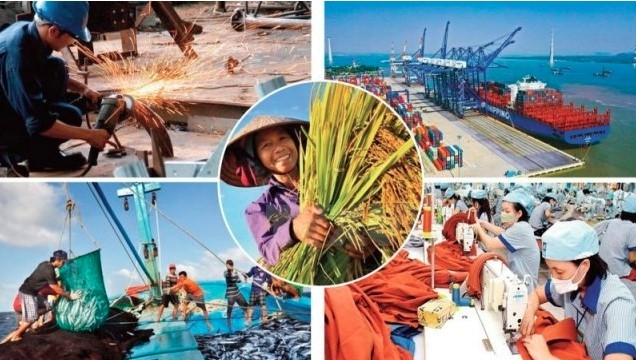Bright spots in Vietnam's economic landscape
VOV.VN - Positive growth in exports and imports, impressive foreign investment attraction, and stable macroeconomic conditions are viewed as the bright spots in Vietnam's economy in 2024.

Highlights in trade and FDI attraction
The year 2024 has drawn to a close with numerous achievements for Vietnam's economy, including GDP growth projected to exceed 7%, higher than the initial target of 6-6.5% set by the National Assembly and the Government at the beginning of the year.
Commenting on Vietnam's economic performance, Dr. Nguyen Dinh Cung, former Director of the Central Institute for Economic Management (CIEM) under the Ministry of Planning and Investment, stated that the Vietnamese economy in 2024 experienced a mix of bright and less bright spots. However, the bright spots include maintaining macroeconomic stability and key economic balances, as well as controlling inflation.
"This is a critical achievement, and Vietnam has recorded relatively good growth," Cung assessed. He further emphasized that Vietnam, as an open economy, saw positive growth in exports and imports in 2024 by capitalizing on opportunities from international economic integration.
Sharing an optimistic view on Vietnam's economic growth in 2024, Dr. Nguyen Quoc Vietnam, deputy director of the Vietnam Institute for Economic and Policy Research (VEPR) under the University of Economics, Vietnam National University, Hanoi, remarked that despite global challenges such as trade and political conflicts disrupting supply chains, economies worldwide have adapted quickly and shown recovery in trade and investment. Accordingly, the Vietnamese economy in 2024 also obtained significant results, with positive growth in trade and investment.
Specifically, according to calculations by the General Department of Customs, with the strong recovery of global trade, Vietnam's total import-export turnover in 2024 reached US$782.33 billion, the highest level ever.
Specifically, according to calculations by the General Department of Customs, with the strong recovery of global trade, Vietnam's total import-export turnover in 2024 reached US$782.33 billion, the highest level ever.
Meanwhile, the Ministry of Industry and Trade reported that Vietnam's trade value in 2024 increased by 15% compared to 2023 and exceeded the assigned target by 2.5 times. The trade balance posted a surplus for the ninth consecutive year, with nearly US$25 billion.
In addition to trade, Dr. Nguyen Quoc Viet highlighted the recovery and breakthrough of foreign direct investment (FDI) inflows into Vietnam in 2024.
Over the past 11 months of the year, foreign investment inflows into Vietnam totaled approximately US$31 billion in registered capital, with US$21 billion in realized capital, a significant increase compared to the same period in 2023.
In the first 11 months of the year, foreign investment inflows into Vietnam totaled approximately US$31 billion in registered capital, with US$21 billion in realized capital, a significant increase compared to the same period in 2023.
"Another noteworthy point is the resurgence of private investment flows, demonstrating that Vietnamese businesses are gradually adapting and recovering strongly. Along with this is the return of trust in Vietnam’s investment and business environment," Viet affirmed.
Challenges and expectations for 2025
In 2025, the Government has set a GDP growth target of 8%, laying the foundation to achieve a double-digit growth target during the 2026-2031 period. This is considered an extremely challenging goal amidst the unpredictable developments of the global economy.
Although the economic picture in 2024 showed many positive points, Dr. Cung also candidly stated that a closer look revealed that, while there were bright spots, Vietnam's economy in 2024 still faced areas that were not so positive.
Specifically, the private enterprise sector continued to face numerous challenges, with a high rate of businesses withdrawing from the market, indicating that while the business environment has improved, it has yet to meet the necessary requirements.
To address these issues, Cung emphasized that Vietnam must continue to improve its business environment, aiming to create a favorable investment and business environment. This involves working alongside and sharing the difficulties of the business community through concrete actions, addressing feedback from business communities and associations, and resolving critical obstacles in the business environment.
"The most important factor for private investment is not financial incentives, but a favorable, transparent, and reliable system that supports their business activities. I believe this is what businesses are eagerly awaiting in 2025," Cung asserted.
Vietnam's trade and industrial production have shown positive signs of growth, yet they remain heavily reliant on foreign direct investment (FDI) enterprises. This growth has been assessed as unsustainable, as it is largely beyond Vietnam's control.
Cung stated that Vietnam needs a more balanced development between export orientation and the growth of the domestic market and local production sectors. Policies to stimulate the development of the domestic market and private enterprises are essential to sustain and build long-term growth.
In addition to these solutions, Viet underscored that focusing on investments in science and technology, higher education, and vocational training is crucial for Vietnam to "rise" and improve the competitiveness of both the national economy and Vietnamese businesses.
Seasia Stats, a reputable statistical platform for Southeast Asian nations, has recently projected that Vietnam's economy will rank 12th in Asia in 2025, with an estimated GDP of approximately US$506 billion.
Vietnam is considered one of the powerhouses in production and trade, continuing to attract foreign investment, particularly in manufacturing and electronics. The country’s trade agreements and its strategic location further strengthen its integration into the global economy.


